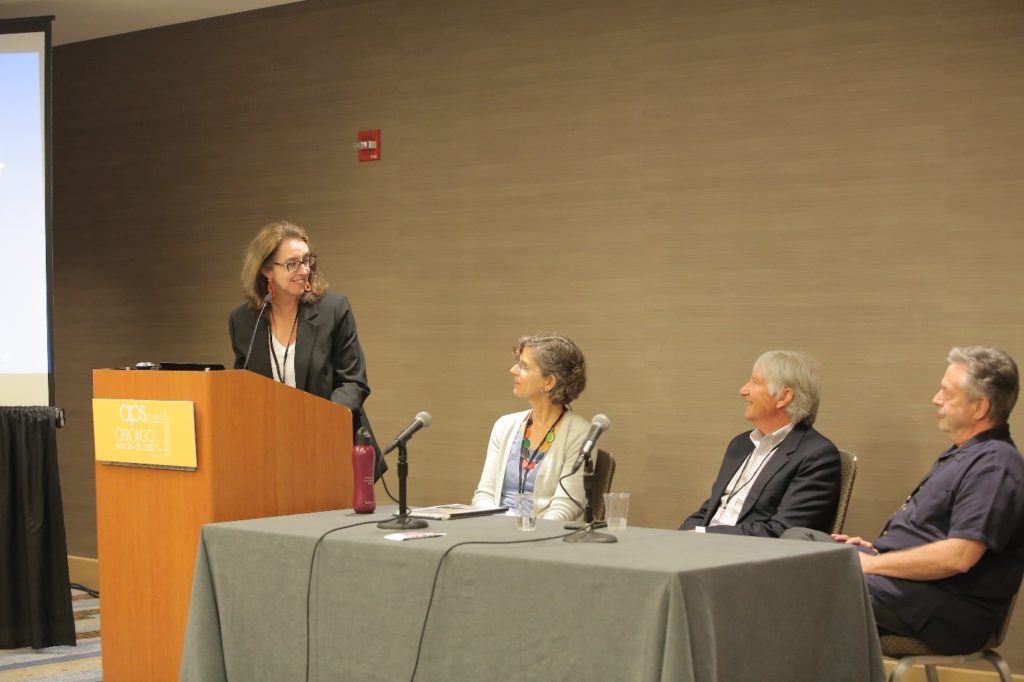Government Relations
National Academies Release Consensus Report on Ontologies in Behavioral Science
APS-cosponsored report debuts at APS 2022, offers recommendations for stakeholders.

Photo Above: Carla Sharp, Alexandra Beatty, Robert Kaplan, and Timothy Strauman present the ontologies study findings to APS 2022 attendees.
The National Academies of Sciences, Engineering, and Medicine (NASEM), one of the world’s most trusted scientific advice bodies, has issued a new set of recommendations on the use of scientific ontologies—scientific labels and definitions—in a new report cosponsored by APS, coauthored by APS members, and presented at the 2022 APS Annual Convention.
The report, “Accelerating Behavioral Science Through Ontology Development and Use,” identifies gaps in the landscape of existing behavioral ontologies and offers recommendations for how ontologies could be strengthened.
APS joined with other organizations in the behavioral sciences and several U.S. science funding agencies in sponsoring the study that informed the report.
Study results were presented for the first time at APS 2022 in Chicago. Members of the committee that conducted the study briefed attendees and answered questions on the study’s mission, process, and results. APS Fellow Carla Sharp (University of Houston) chaired the session, which also featured APS Fellow Timothy J. Strauman (Duke University), study chair and psychological scientist Robert M. Kaplan (Stanford University), and Alexandra S. Beatty, the NASEM senior program officer who directed the study.
In the resulting report, the committee defines scientific ontologies as “systems and/or knowledge structures that specify concepts of science with agreed-upon labels and definitions and provide a framework for complex relationships among the concepts.” The study explored similarities and differences among existing ontologies, such as the Behavioral Change Intervention Ontology, social and behavioral determinants of health, and the Diagnostic and Statistical Manual, or DSM.
Related content from this issue: Dueling Diagnoses: Concerns about overlapping symptoms, complex disorders lend momentum to diagnostic models that could supplement—or even supplant—the DSM.
At APS 2022, presenters observed that continuing to develop ontologies in the behavioral sciences will benefit the field. Among other conclusions, the committee expressed belief that the development and use of ontologies could “move behavioral science forward from a domain in which research is generally siloed and the data and results are often incompatible to one in which the evidence is searchable and more easily integrated and in which computer technology is leveraged in the discovery of new relationships, the development of novel hypothesis, and the identification of knowledge gaps.”
Besides Kaplan, Sharp, and Strauman, members of the committee included APS Past President Lisa Feldman Barrett (Northeastern University), APS Fellow Catherine Hartley, and APS Fellow Randall W. Engle (Georgia Institute of Technology). Other areas of psychological and other behavioral and social sciences were represented by other committee members.
Read the report
APS recommends that APS members read the final report, which provides an in-depth analysis of the current state of ontologies in the behavioral sciences and expands on the recommendations summarized in this article. Download the full report, “Accelerating Behavioral Science Through Ontology Development and Use.” Find more information about the study on the National Academies Behavioral Ontologies website.
A defining characteristic of a NASEM report is the set of recommendations it makes to the external community; the report on ontologies provides six recommendations for stakeholders, professional organizations, and government agencies. These recommendations include federal agencies such as the National Institutes of Health and National Science Foundation creating an agenda to develop ontologies and provide funding to help develop behavioral ontologies, and the White House Office of Science and Technology Policy reviewing how ontologies have been implemented across federal agencies.
Of special interest to APS members, the report also recommends that APS collaborate with other behavioral and social science organizations to improve the use of ontologies and data sharing in scientific journals, work ontology development into the curriculum for graduate-level teaching and training, and coordinate ontology development across other groups in science.
Feedback on this article? Email [email protected] or login to comment.





APS regularly opens certain online articles for discussion on our website. Effective February 2021, you must be a logged-in APS member to post comments. By posting a comment, you agree to our Community Guidelines and the display of your profile information, including your name and affiliation. Any opinions, findings, conclusions, or recommendations present in article comments are those of the writers and do not necessarily reflect the views of APS or the article’s author. For more information, please see our Community Guidelines.
Please login with your APS account to comment.